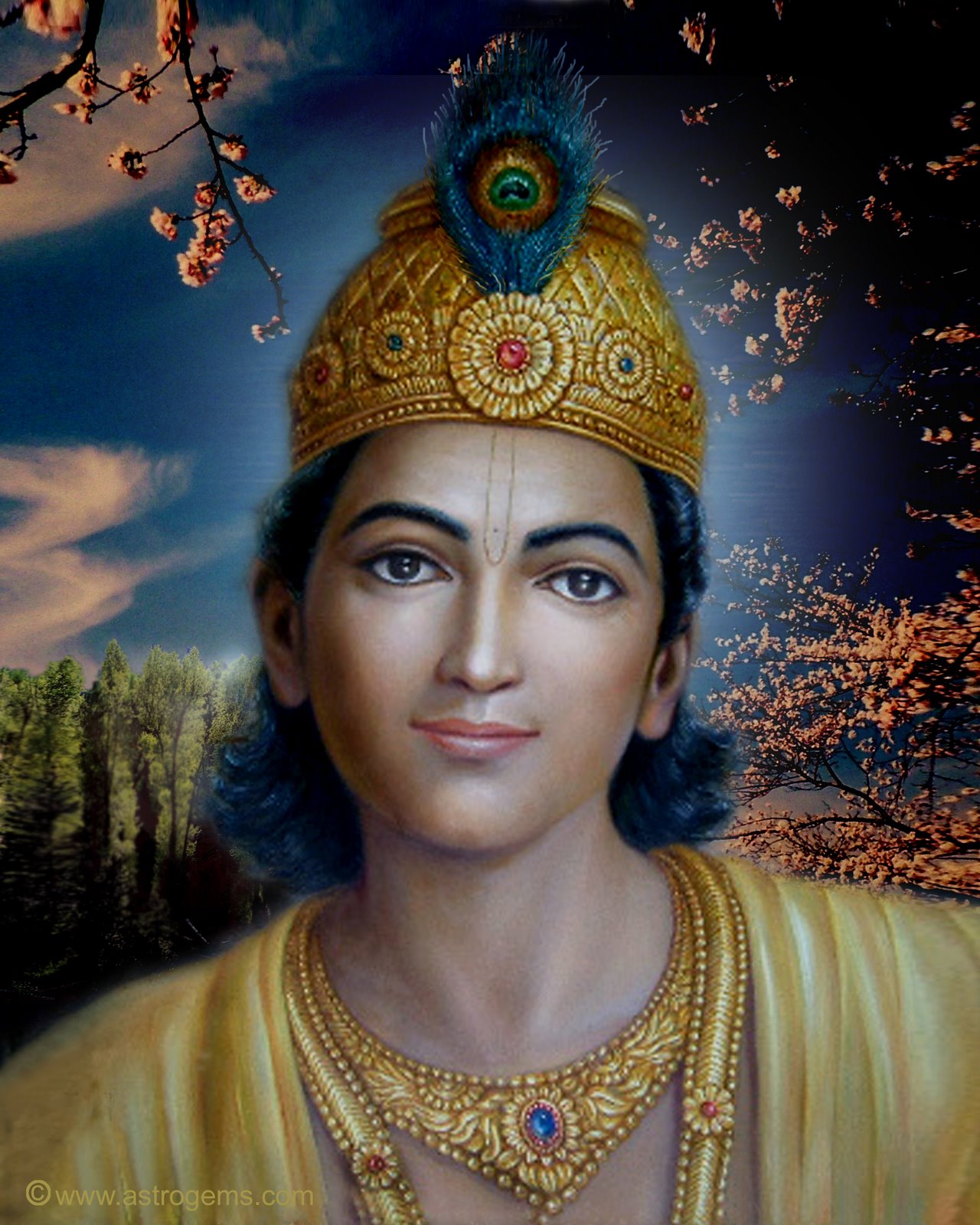Teachings of Krishna from the Bhagavad Gita (the Hindu Bible).
Thy human right is for activity only, never for the resultant fruit
of actions.
Do not consider thyself the creator of the fruits of thy
activities; neither allow
thyself attachment to inactivity.
(2:47)
Arjuna said: O Keshava (Krishna)! What are the characteristics of the
sage who possesses ever calm wisdom and who is steeped
in samadhi
(ecstasy)? How does this man of steady wisdom speak
and sit and walk?
The Blessed Lord Replied: O Partha (Arjuna)! when a man completely
relinquishes all desires of the mind, and is entirely
contented in the Self, by the
Self, he is then considered to be one settled in wisdom.
He whose consciousness is not shaken by anxiety under afflictions nor
by attachment to happiness under favorable circumstances;
he who is free from
worldly loves, fears, and angers he is muni of steady
discrimination.
(2: 54-56)
The Cosmic Lord said: O Sinless One, at the onset of creation, a twofold
way of salvation was given by Me to this world: for the
wise, divine union
through wisdom; for the yogis divine union through active
meditation.
Actionlessness is not attained simply by avoiding actions.
By forsaking
work no one reaches perfection.
Verily, no one can stay even for a moment without working; all are indeed
compelled to perform actions willy-nilly, prodded by the
qualities (gunas) born of
Nature (Prakriti).
The individual who forcibly controls the organs of action, but whose
mind
rotates around thoughts of sense objects, is said to be
a hypocrite, deluding
himself.
But that man succeeds supremely, O Arjuna, who, disciplining the
senses by the mind, unattached, keeps his organs of activity
steadfast on the
path of God-uniting actions.
Perform thou those actions that are obligatory, for action is better
than
inactivity; even simple maintenance of the body would
be impossible through
inaction.
(3:3-8)
Other devotees offer as sacrifice the incoming breath of prana in the
outgoing breath of apana, and the outgoing breath of apana
in the incoming
breath of prana, thus arresting the cause of inhalation
and exhalation (rendering
breath unnecessary) by intent practice of pranayama (the
life-control technique
of Kriya Yoga).
(4:29)
A muni he who holds liberation as the sole object of life and
therefore
frees himself from longings, fears and wrath controls
his senses, mind, and
intelligence and removes their external contacts by (a
technique of) making
even (or "neutralizing") the currents of prana and apana
that manifest (as
inhalation and exhalation) in the nostrils. He fixes
his gaze at the middle of the
two eyebrows (thus converting the dual current of the
physical vision into the
single current of the omniscient astral eye). Such
a muni wins complete
emancipation.
(5:27-28)
Free from ever-hoping desires and from cravings for possessions,
with
the heart (waves of feeling) controlled by the soul (by
yoga concentration),
retiring alone to a quiet place, the yogi should constantly
try to unite with the
soul.
(6:10)
Established on that seat, concentrating the mind on one point,
and
controlling the activities of the fanciful faculty (chitta,
feeling the power that
visualizes) and the senses, let him practice yoga for
self-purification.
Firmly holding the spine, neck, and head erect and motionless, let the
yogi focus his eyes at the starting place of the nose
(the spot between the two
eyebrows); let him not gaze around in various directions.
(6:12-13)
O Arjuna! The gourmand, the scanty eater, the person who habitually
oversleeps, the one who sleeps too little none of
these finds success in yoga.
He who with proper regularity eats, relaxes, works, sleeps, and remains
awake will find yoga the destroyer of suffering.
(6:16-17)
The Blessed Lord said: Fearlessness, purity of heart, perseverance
in
acquiring wisdom and in practicing yoga, charity, subjugation
of the senses,
performance of holy rites, study of the scriptures, self-discipline,
straightforwardness;
Noninjury, truthfulness, freedom from wrath, renunciation, peacefulness,
nonslanderousness, compassion for all creatures, absence
of greed,
gentleness, modesty, lack of restlessness;
Radiance of character, forgiveness, patience, cleanliness, freedom from
hate, absence of conceit these qualities are the
wealth of a divinely inclined
person, O Descendant of Bharata.
(16:1-3)
Amazon.com's best-selling translation and commentary on the Bhagavad
Gita is published by Self-Realization Fellowship.
"God
Talks With Arjuna: The Bhagavad Gita," by Paramahansa Yogananda is
available at Amazon.com:

In the Introduction of this book, Paramahansa Yogananda says, "The
Gita's wisdom is not for dry intellectualists to perform mental gymnastics
with its sayings for the entertainment of dogmatists; but rather to show
a man or woman living in the world, householder or renunciant, how to live
a balanced life that includes the actual contact of God, by following the
step-by-step methods of yoga."

See also a Story
of Young Krishna.



![]()